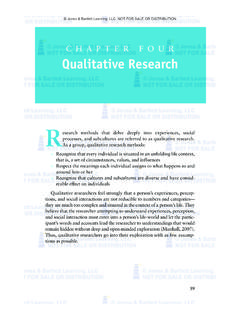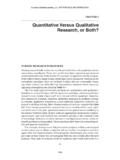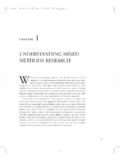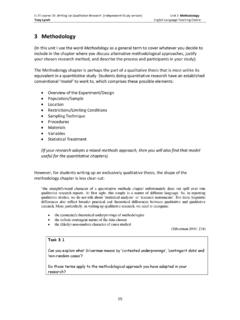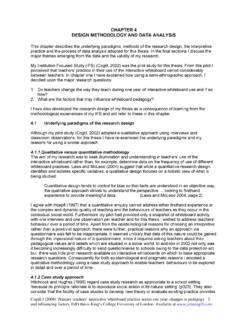Transcription of Qualitative Psychology Nexus: Vol. 8
1 Qualitative Psychology nexus : Vol. 8 Hannu Soini, Eeva-Liisa Kronqvist & G nter L. Huber (Eds.)Epistemologies for Qualitative research Center forQualitativePsychologyAll parts of this publication are protected by copyright. All rightsreserved. No portion of this book may be reproduced by anyprocess or technique, without the prior permission in writingfrom the concerning reproduction should be sent to the pub-lisher (see address below).Bibliographic information published by Die Deutsche BibliothekDie Deutsche Bibliothek lists this publication in the DeutscheNationalbibliografie; detailed bibliographic data is available inthe Internet at Edition 2011 Center for Qualitative Psychology Prof. Dr. G nter L. Huber Viktor-Renner-Str. 3972074 T bingen,Germany Tel. +49 7071 3-9810087-3-1 ContentIntroductionEpistemology- A Tool or a Stance? 5 Hannu Soini & Eeva-Liisa KronqvistChapter IEpistemological Heuristics for Qualitative Joseph MaxwellChapter IIThe World According to Players of "Killer Games" - 27 a Constructivist Approach to Player Thinking.
2 G nter L. HuberDesigning research on the Popular Practice of Baby Mechthild KiegelmannChapter III Qualitative Analysis of Possibilities and Difficulties of Inclusion 65of Quality. Samuel Gento, Antonio Medina & Jorge PinaFormation of Teachers Using their Self-experience:85 Emergence of Constructional Models of Professional and Intercultural Knowledge. Mar a Concepci n Dom nguez, Antonio Medina & Jorge Methods in Vocational Education and Work91 Psychology research : Results from Expert Interviews in High Technology Vocational Training. Karin Schweizer & Petra KorteChapter IVBridging the Gap Between Personal and Social Construction:101 Discourse Analysis and PCP Techniques. Jelena PavlovicFrom Empathy to its Finnish Equivalent How Should113We Understand Experiences? Teemu SuorsaInterview as Procedure in the Practice of lvora Feliz, Tiberio Feliz & Mar a Carmen RicoyDiaries and Self-Reflection in the Practical Carmen Ricoy, S lvora Feliz & Tiberio FelizAuthor Notes167 Author Index169 Subject Index1716 IntroductionEpistemology A Tool or a Stance ?
3 Hannu Soini and Eeva-Liisa KronqvistWhat do we have to know about epistemology?The 9th annual meeting of the Center for Qualitative Psychology was held inNorthern Finland, near to the city of Oulu. The seminar was started with twocrucial questions leading the participants to the theme of the conference. Theorientation followed the line of the former meetings of the Center forQualitative research in Psychology helping participants to reflect own ways ofdoing psychological research . In the beginning of the conference we asked theconference participants a very simple question or a question which soundssimple; what do you want to know about epistemology. In small groups theparticipants expressed they want to find answers to questions like - what isepistemology, are there many epistemologies, what do we mean by epistemologyand what epistemological approaches do we have in Psychology .
4 During the twoconference days these questions we reformulated and new themes wereelaborated by the participants. At the end of the seminar the participants werefinally asked "in what questions did you find answers?" Here we summarizesome most interesting themes that the conference participants discussed duringthe small group meetings. The themes are following, of course, the interest ofthe writers of this introduction; many other interesting questions were groups discussed first for what purposes do we need epistemology? Much ofthe debate in this field has focused on analyzing the nature of knowledge andhow it relates to similar notions such as truth, belief, and also deals with the means of production of knowledge, as well asskepticism about different "knowledge claims.
5 " The knowledge and itscharacteristics are defined by the way knowledge and the basic foundations ofknowledge are found. There should be evidence of this kind for the knowledgeto become generally accepted and public, truthful and believable. Traditionally,objectivity and truth are the classical criteria for evaluating knowledge. Thisbrings us to the approach, which emphasizes the scientific method as a way toarrive at the ideas of Joseph Maxwell's outstanding key note lecture, theparticipants stated that epistemology is not a stance you have to decidebeforehand or to follow literally regardless of the demands you meet in yourstudy. Instead, it is a tool you may use as a researcher in your personal way to first to formulate appropriate questions, then finding reasonable , the chosen epistemological stance needs to be argumented.
6 It wasalso suggested that we should choose a dialectical approach to : A tool or a stance?7 What epistemologies do we have in Psychology ? Traditionally in philosophy the basic epistemological questions have beenconcerned with the origin of knowledge. In the Psychology there have been twoopposite theoretical approaches rationalism/nativism and empiricism/associa-tionism. The first one the Platonic view looks at the origin of knowledgebeing based on innate ideas. Experience provides the occasions for empiricism or Aristotelian view sees on the other hand the origin ofknowing developing from a clean slate and the experience being the source ofknowledge. If one common and unique natural-science ideal of knowledge isrejected it does not mean that a new common epistemological position has to beformulated.
7 Many teachers at the university may share the experience that somestudents when starting to prepare their master s thesis have beforehand decidedto apply Qualitative methods in their study. They have not yet specified the topicof their research , but they already know their epistemological stance. They easilygo straight to the methods without thinking why and how the research questionscould be answered. In this situation teacher starts to wonder what students maythink or know about epistemology. Why do we do what we do? One of the conference participants (Ceglowski 2000, pp. 88-89) tells us a storyabout her mentor Norman Denzin, which describes the problem typical forepistemology: I am sitting in a classroom at the University of Illinois. The windows areopen because it is warm and we all know that Norm will want a smoke.
8 Afew minutes after two, Norman Denzin, unkempt long gray hair, dressed inold baggy shorts and shirt and $ rubber thongs, reading glasses aroundhid neck, pack of Camels hanging out of his pocket, enters and sits watercolor blue eyes study those of us sitting in front of him. He pullsout a cigarette, lights it, and in his booming voice tells us his story:Right after I think it was Kennedy died I was sent out to interviewpeople. As I went house to house I met people crying, unable to , I didn t have the heart to ask them the survey questions. I realizedthat I didn t believe in what I was doing. It was then, in this epiphany thatI decided there had to be a different way of doing research . It was then Istarted to think about Qualitative Norm finishes his story, he looks out and smiles at me. Perhaps itis the combination of the story, the smile, and the autumn leaves rustlingthrough the open windows that make this memory so vivid.
9 Yet I knowthat Norm story calls me to enter the lived experience of those I his help, I plan to conduct my study (about Head Start). What I donot realize is what doing research in this way entails. I do not understandwhat it feels like to enter into the lives of (others). Hannu Soini and Eeva-Liisa Kronqvist8 This is why I am a Qualitative researcher and this is the reason Iresearch the way I do. It is inherently valuable and immeasurably episode nicely shows us that when we as researchers choose the way wedo, it is actually strongly a personal question. Knowledge is created in socialinteraction between investigator and respondents and the "results" or "findings"are literally created as the investigation proceeds (see Denzin & Lincoln1994). The Epistemologies for the Qualitative research presents articles on four extensivethemes about Qualitative research and the psychological and educationalresearch.
10 The Epistemologies for the Qualitative research seeks to highlight andillustrate the variety of epistemologies and the personal stance every researcherhave to take to these questions. The first topic is concentrated on the epistemo-logical questions. The article by Joseph Maxwell is based on his key note presen-tation at the 2008 workshop and it presents epistemological heuristics forqualitative research . The second topic includes two viewpoints to practical andstrongly context-based debate of brutal computer games and specified earlycommunication. In his presentation G nter Huber describes how fans of brutalcomputer games react to critique of their hobby. Concluding from theirreactions Huber asks how does the world look like in which these people areliving and are there links or borders between their virtual and real Huber debates the epistemological problems the researcher meets whentrying to interpret correctly the reactions of killer game fans.
